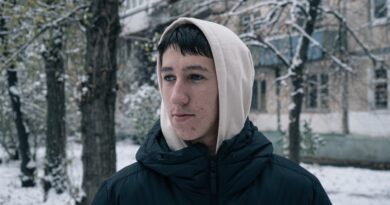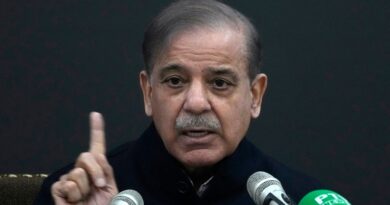Tensions high in France on day of funeral of teen shot by police
There was no major police presence here.Young men patrolled the neighborhoods, chasing journalists from the area, and the mosque where the service was held was closed to the public.
Nahel M., who was of North African descent, was just 17 years old when police shot and killed him during a traffic stop in Nanterre earlier this week. His death spurred days of nationwide riots, in which thousands have been arrested or detained.
French President Emmanuel Macron has struggled to contain the unrest and on Saturday canceled a long-anticipated state visit to Germany, the country’s closest ally in the European Union. Authorities mulled imposing nighttime curfews and other measures to quell the turmoil.
The government mobilized some 45,000 police officers in anticipation of more unrest and ordered local officials to suspend bus and tram services. Police arrested or detained more than 1,300 people on Friday night alone, according to the Interior Ministry.
Nahel’s family had hoped that the funeral could be just that — a moment of mourning and remembrance undisturbed by the media, violence and political fallout.
“The family hoped for discretion,” Yassine Bouzrou, a lawyer representing the family, said in an interview.
But in Nanterre and other French suburbs, Nahel has become a symbol of the fears many here harbor toward police. French law enforcement often acts with impunity — and discriminates against minority communities, residents say. Many in this suburb see themselves in Nahel, a French citizen with Algerian and Moroccan roots who loved motorbikes and rap music.
Lawyers for Nahel’s family maintain that he had no criminal record. But the local prosecutor said he had a history of not complying with police at traffic stops. He was on the road often, working as a delivery driver.
Still, “Nahel was not a highwayman,” Jean-François Puech, the founder of the Ovale Citoyen association, told the Sud Ouest newspaper earlier this week.
Earlier this year, Nahel attended events hosted by the local sports association, according to Puech.
“To me, Nahel was the typical example of a neighborhood kid,” Puech said, adding that he “wanted to get away from it.”
The tensions have also spread overseas. On the island of Réunion, a French department in the Indian Ocean, authorities said dozens of people were detained for rioting on Friday night.
Many events scheduled for this weekend, including Marseille’s annual Pride march, were canceled or postponed.
Protesters say their anger has been compounded by what they see as an attempted police coverup. Authorities have detained the officer suspected of shooting the teen and are investigating him for intentional homicide.
The initial police narrative suggested the victim’s car had tried to plow into them. But video footage contradicted the police accounts, showing an officer who appeared to fire a shot as the car pulled away.
“The video clearly shows that the policeman was not in danger and that he had no right to shoot,” said Bouzrou.
Speaking to French television network BFM, the detained police officer’s lawyer, Laurent-Franck Lienard, said the officer had aimed his firearm at Nahel’s leg and accidentally pulled the trigger, hitting the victim’s chest as the car sped away.
“Obviously (the officer) didn’t want to kill the driver,” Lienard told BFM.
Macron was quick to condemn the shooting, but he has yet to fully address the calls for more accountability, including demands for tighter rules around when police officers can use their weapons.
Researchers say the number of similar police shootings has risen sharply in recent years, after a law was passed in 2017 that relaxed conditions for police to shoot at moving vehicles if they are deemed to pose potentially fatal threats.
For Macron, the riots are another political challenge in a year that has strained his parliamentary alliance and curtailed his political ambitions. The flare in tensions follows large-scale protests earlier this year over Macron’s unpopular push to raise France’s retirement age.
“Macron was hoping to move the country on after the protests over pension reform. But these riots will undermine his ability to reset, and once again hurt the perception of France’s image in Europe and abroad,” said Mujtaba Rahman, a managing director at the political risk consultancy the Eurasia Group.
Macron’s aborted state visit to Germany would have been the first by a French president in 23 years.
Unlike in 2005, when comparable riots erupted in France, Macron “faces a more difficult, fragmented political environment,” said Rahman.
“Opposition parties on the hard left and far right are now trying to exploit the crisis to further weaken Macron and his government,” he said.
Adela Suliman in London, Kate Brady in Berlin, Ruby Mellen in Washington and Emily Rauhala in Brussels contributed to this report.




